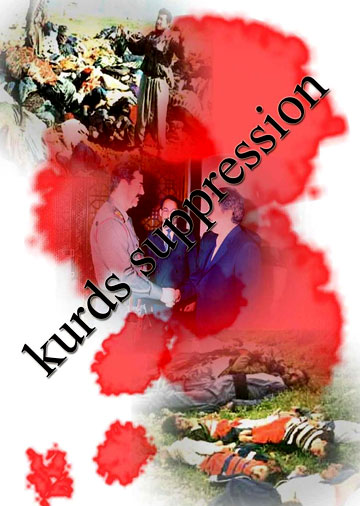| Ordered by Iraq and carried out by Massoud Rajavi, this role in repressing the Kurdish revolt must have created serious problems within the organization. Many members have Kurdish roots. |
 The Massacre of Iraqi Kurds
The Massacre of Iraqi Kurds
The last major Mujahidin operation took place in March 1991, when they fought the Iranian Revolutionary Guards (Pasdaran) near the border city of Qasr-e Shirin and joined with the Iraqi Anny in putting down the Kurds. A Kurdish rebellion had broken out in northern Iraq soon after the end of Operation Desert Stone, launched in January of that year.
Jalal Talebani, leader of the Patriotic Union of Kurdistan in Iraq (PUKI), confined the organization's role. He told reporters "5,000 Iranian Mujahidin had fought alongside Saddam's forces in the Battle of Kirkuk".
Ordered by Iraq and carried out by Massoud Rajavi, this role in repressing the Kurdish revolt must have created serious problems within the organization. Many members have Kurdish roots.
In addition, the PMOI clashed with Kurdish groups within the Iranian opposition, leading to more defections and the further isolation of Massoud Rajavi.
In a statement former members of the organization, combat veterans of the NLA, admit having seen acts of extreme cruelty carried out by Mujahidin against the Iraqi Kurds. They are willing to testify in any international proceeding on the crimes committed by the Mujahidin in Iraqi Kurdistan.
They write: "The Mujahidin, who live off Saddam's generosity, have no interest in rebelling against him. Iraq gives them the anus they need for their attacks on Iran. In helping the Iraqi Anny put down the Kurdish rebellion in March 1991, the Mujahidin wanted to show their loyalty. At that time, Saddam himself awarded Rajavi the Rafidain Medal, a high Iraqi decoration."
It is important to note that the Mujahidin’s largest military operations, "Eternal Light" in 1988 and the Kirkuk massacre of Iraqi Kurds in 1991, accomplished nothing for the Iranian people, either inside or outside their country. Carried out under Saddam Hussein's orders, both provided Iraq with desperately needed strategic support as it emerged, exhausted and near defeat, from two wars.
